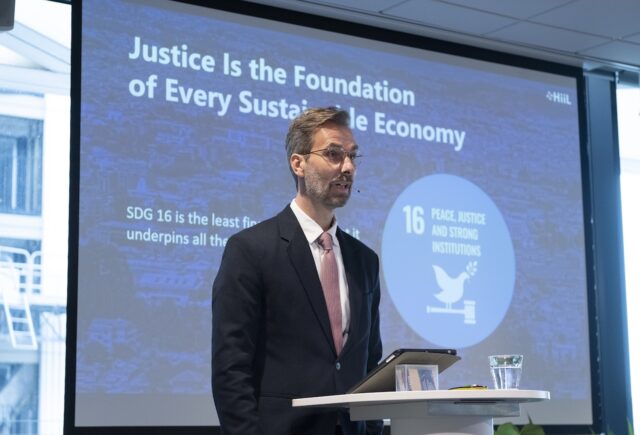A new development in a leading crypto currency claims to be good for the environment. It may also represent a good time for investors to re-examine the whole importance of the ‘token economy’, writes Christopher Walker

In brief
- Crypto currencies are big emitters as the process of “mining” to record transactions on the blockchain consumes vast amounts of energy
- This is about to change radically, as one of the major currencies, Ethereum, launches a new protocol, ‘The Merge’, a ‘proof-of-stake’ digital ledger which involves less mining
- This could remove one significant barrier which has held back impact investors from getting involved in blockchain technologies more generally.
- The advantages of the wider system, the token economy, may now come to the fore in sustainable investors’ thinking.
Crypto currencies are digital currency systems allowing direct online payments between holders. Somewhere around $1 trillion of assets is held in this form. The largest crypto currencies currently are Bitcoin, BNB and Ethereum.
Unlike traditional currencies, ‘cryptos’ are not managed by a central bank, but by a ‘blockchain’, a kind of public digital ledger run by a decentralised global network of high-powered computers. Individuals compete to record transactions, and the first to do so is rewarded. This is called ‘proof-of-work’.
Bitcoin mining consumes enormous amounts of energy. Crypto ‘mining rigs’, a bank of linked computers, consume energy at the rate of an air-conditioning unit. In some mining centres like Kazakhstan there are some 50,000 rigs.
A recent piece of research by Amsterdam and Munich universities looked at Bitcoin’s carbon footprint and found it produced up to 65.4 Mt CO 2 annually. The effect of mining across all the major crypto currencies generates the equivalent emissions of a major industrial nation, certainly larger than those of the Netherlands.
‘The Merge’
Fortunately, this could all be about to change. In a process known as ‘The Merge’, Ethereum is about to launch Ethereum 2.0. Instead of computers trying to solve computations, the ‘proof-of-work’ protocol mentioned above, computers will be randomly selected to create blocks for the blockchain. Miners will be required in the future to simply make ‘proof of stake’ and then be rewarded randomly.
It all sounds very confusing, and perhaps it is no surprise that many investors have yet to become involved in the crypto world.
ByteTree provides research and data for investors looking to understand established digital assets. Regarding ‘The Merge’, Charlie Morris, founder and CIO, tells Impact Investor: “The impact on energy consumption is remarkable and estimated to fall by 99.95% overnight. The network is no longer secured by brute force from the miners.”
Morris sees this having a ripple effect across the crypto sector. “There will still be some ‘proof-of-work’ tokens remaining such as Bitcoin, Dogecoin, Ethereum Classic, Litecoin, Bitcoin Cash and Monero. Yet if the price of these tokens falls, the mining intensity falls too. Most of these proof of work tokens will become irrelevant.”
There will be exceptions. ByteTree expects some to remain relevant over the long-term. Bitcoin, a liquid alternative asset, and Monero, with its privacy focus, for example.
Certainly, for Todd Lippiatt, NAX’s head of capital markets, when it comes to “store of value coins…I don’t anticipate these types of protocols making a similar migration because this presents a massive change to their respective fundamental theses. If anything, proof-of-work protocols will lean into finding renewable energy sources to power their mining rates”.
Morris says: “The other meme coins such as Dogecoin will eventually become worthless, along with Bitcoin clones such as Bitcoin Cash and Litecoin. Ethereum Classic is no longer connected to ETH and, assuming ‘the merge’ goes according to plan, will also become irrelevant.”
Opportunities for investors?
Jeff Schumacher, NAX’s founder & CEO, believes there is a lot more to this. “The Merge presents a more affordable, scalable way for marketplaces of relevance to impact investors to actually develop.”
Crypto is all about buying a coin, as he sees it, which doesn’t directly translate to opportunities for impact investors. “The development of the token economy does matter to impact investors, however, and is an area of high interest.”
The primary opportunity here is that the token economy can simplify investment opportunities and transparency. As we transition from what practitioners call a Web2 economy to a Web3 one, Schumacher says “we are finding that issues can stem from things like architecture that isn’t optimised and doesn’t use the history of traditional market structures as a guide, and regulatory requirements that are either slow to emerge or stifle growth”.
According to Schumacher, decentralised applications, dApps, are the means by which investors can, “for example, measure the carbon footprint of a supply chain, save an old growth rainforest in Latin America, etc”.
Beyond environmental impact
The environmental impact is one thing, but Schumacher’s team is actually “most excited about The Merge’s impact on a more holistic level”. He sees data management on the blockchain as “incredibly compelling” to investors, allowing them to manage “executive leadership and pay, shareholder rights, and audits – [all] thanks to the transparency and immutability of putting these processes on-chain”.
In addition, the thinks ‘The Merge’ will help “make strong inroads for companies to structure themselves for not only financial returns but measurable and sustainable impact”.
Morris agrees: “It is unlikely that impact investors are currently engaged with crypto, but they should be because …it sits at the forefront of fintech, with the long-term aim to host the global financial system.”
His vision is for crypto to host the entire financial system, whereby one day all shares, bonds, commodities, currencies, and derivatives transact using crypto infrastructure. Settlement times would be instantaneous while remaining secure, with added transparency and lower cost.
Morris concludes: “In the coming years, investors will find it increasingly hard to ignore this fast-growing industry.”





